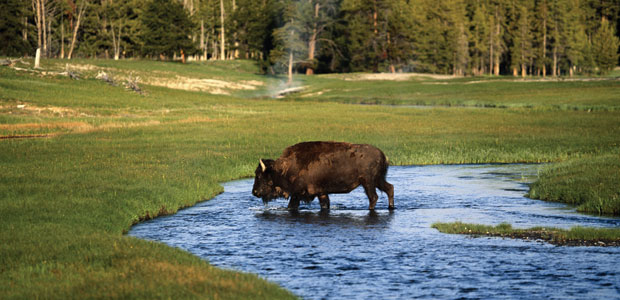Advertisement
Home on the Range
Get in the game

There’s much to be concerned about these days when it comes to our meat supply. Mad cow disease, contaminated fish, factory-farm pollution, and antibiotics may cause some carnivores to give up their juicy steaks for tofu.
However, there are safe alternatives that can satisfy any red-meat craving. One healthy alternative is game meat, which includes elk, buffalo (bison), ostrich, and venison. Game meats are tasty, nutritious, and free of many health and environmental concerns that go along with meat from today’s factory-farm animals.
Better Nutritional Value
Game meats fit into a heart-healthy diet because they are low in saturated fat. They are also nutrient-dense, that is, they are a great source of nutrients in relation to their caloric value. Some of these nutrients include protein, zinc, iron, vitamin B12, and selenium. The protein found in game meats is high in quality and can, therefore, help contribute to maintaining and increasing lean body mass.
You can thank the conditions under which the animals were raised for their nutrient density. The majority of game animals are raised on grass, with plenty of room to roam. This results in a leaner meat, often higher in essential omega-3 fats than meat from cows raised on grain in factory farms. Omega-3 fats have a wide range of health benefits, including helping to keep our hearts, brains, and skin in top shape.
According to Dr. Marty Marchello, a professor of animal and range sciences at North Dakota State University, game meats like buffalo have a more favourable fatty-acid profile than traditional beef. They contain fewer fats such as palmitic acid (a saturated fat) that can raise cholesterol levels and potentially contribute to heart disease.
Game animals are often slaughtered later in life than cows are. This is nutritionally significant because iron levels are higher in older animals. For this reason, Dr Marchello’s research shows that buffalo meat has more highly-absorbable iron than beef. Iron deficiency is typically a problem for premenopausal women and female athletes due to low intakes and blood loss through menstruation. Low levels can lead to fatigue and a host of health issues.
Environmentally Friendly
Raising large amounts of livestock has a severe negative environmental impact on our land, air, and water. For example, manure discharged from highly populated corporate livestock factories pollutes both soil and groundwater. “In terms of environmental impact, the fact that our elk are not concentrated in feed lots eliminates the problem of manure management,” says John Rietkerk who owns an elk ranch in Rockwood, Ontario. John points out that raising fewer animals means no holding pits are required; the manure is distributed naturally.
Many consumers are concerned with the inhumane, crowded, and stressful conditions under which cows, chickens, and hogs are forced to live on factory farms. Game meats are often raised by farmers such as Rietkerk, who practise small-scale farming using humane and environmentally responsible farming techniques. “Our animals are free to roam outdoors all year round, are not administered antibiotics, and are pasture-fed on pesticide- and herbicide-free grass,” says Rietkerk. Choosing game meats also helps support small-scale farmers who are struggling to survive in a world dominated by corporate agricultural practices.
One of the best ways you can take action to reduce the environmental and ethical consequences of raising animals for food is to consume more plant-based foods. But if you choose to eat a moderate amount of animal protein for health reasons, game meats can provide a healthier and more ethical option.
All of this makes game meats one of the best animal-protein choices. Look for game meats at specialty meat shops, natural food stores, or farmer’s markets. Since game meats are very lean, they should be cooked at a lower temperature and for less time than fattier meats like beef.
| Nutritional values | ||||
| Meat | Calories | Fat (g) | Cholesterol (mg) | Protein (g) |
| Caribou | 167 | 4 | 109 | 30 |
| Ostrich | 155 | 3 | 93 | 28 |
| Deer (Venison) | 150 | 2 | 79 | 30 |
| Elk | 146 | 2 | 73 | 30 |
| Bison (Buffalo) | 143 | 2 | 82 | 28 |
| Moose | 134 | 1 | 78 | 29 |
| Chicken – skinless | 165 | 4 | 85 | 31 |
| Beef – lean, ground | 271 | 17 | 91 | 26 |
| *Values based on 100-g cooked portion Source: Compiled from data from USDA National Nutrient Database www.nal.usda.gov/fnic/foodcomp/search/ |
||||





